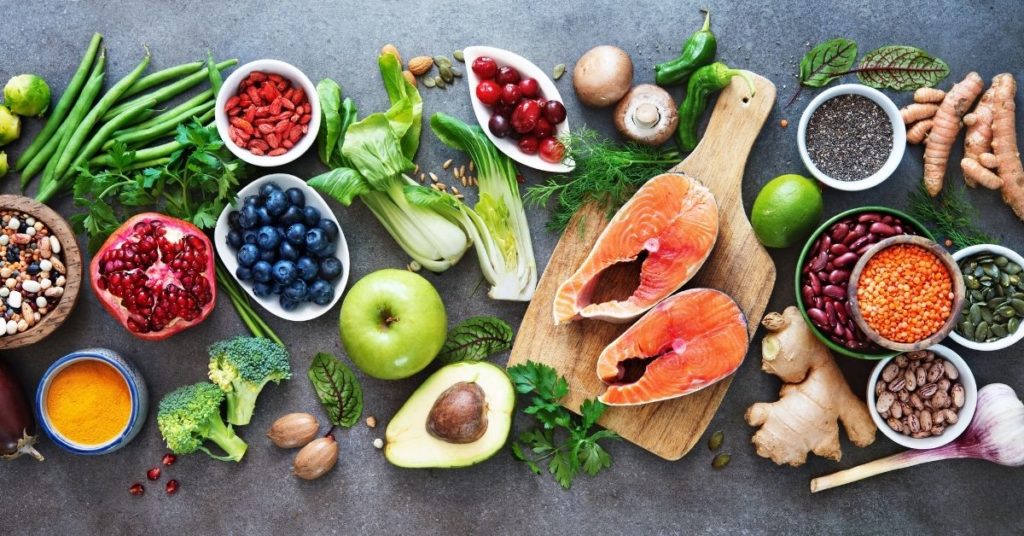Readings: Genesis 2:7-17 | Romans 6:19-23 | Mark 8:1-9
Text: Mark 8:1-6
What do you think about food? You like it? I do, too. I’m sure we could share some enthusiastic stories about our favorite meals.

What would you do to get it? When we’re children, it’s given to us. But when we get older and move out of the nest, suddenly food means work. Either you have to work more and afford the restaurant bill or the groceries and time to make food yourself. On a rare occasion, you may be invited to something where they just feed you for being there.
A less comfortable question, How long could you go without it? and What would happen to you if you had to go without it? These are unpleasant things to consider, and it’s this situation that the crowd in the Gospel finds themselves. Jesus gathers a crowd around Himself, into a wilderness place, knowing full well that they have nothing to eat, not just for several hours but “now three days.”
It’s in this privation that our Lord is unveiling just who He is and what kind of God and Savior He is. Though their hungering and isolation, God is showing that
WITH SINFUL HEARTS AND BODIES, WE ABUSE AND FORGET GOD’S PROVIDENCE, BUT JESUS CAME IN THE FLESH TO HAVE COMPASSION ON US AND MAKE US TRULY AND ETERNALLY ALIVE.
- God certainly gives daily bread to everyone without our prayers, even to all evil people.
In the Lord’s Prayer, we beseech our Father, “give us this day our daily bread,” which seems like a very mundane request. Didn’t Jesus also teach, “your heavenly Father knows you need all these.” (Matt. 6:32) Of course He knows it. The Old Testament lesson (Genesis 2:7-17) brings us back to our origin and gives us insight about why we desire and need food: God made this world, and us in it. He created us to be dependent on Him.

Do you know what is most successful at attracting people to an event? Food. That’s because even in our sinful state, all people recognize that food is necessary and most of the time, eating is enjoyable. But because of what happened in Genesis 3, we don’t recognize that this desire is the result of our created nature. Yet all people, from the moment they are born, know the urge.
Lutherans, after the humor of Garrison Keillor, are teased for always having food close at hand. Rightly understood, good food can be enjoyed with thanksgiving to God (as I hope we will do after service today). But when that is taken away, what happens? Our sinful nature lashes out in complaint, forgetting all ways God has supported us undeservedly these many years.
Similarly, because Martin Luther lived in a time of much beer, many followers of his theology also enjoy what some affectionately call “cold Lutheran beverages.” But like the full belly resulting from fellowship meals, we are prone to gluttonously crave the enjoyment of the gift and despise the giver of that gift.
- But we pray in this petition that God would lead us to realize this and to receive our daily bread with thanksgiving.
So, what is Jesus up to with this feeding miracle? The answer to that is found in looking back through the last couple chapters before this in Mark, beginning with the Feeding of the 5,000 in Mark 6. In a string of encounters, each of them contribute to the understanding of just who Jesus is, so that we creatures don’t worship gifts apart from the Giver of them.
In the feeding of the 5,000, in a desolate place, Jesus provides food for a great crowd, thus showing Himself as the originator of divine Providence. When Jesus walks on the water, He shows His disciples that He is the Creator Himself, come with human feet. Across the lake in Gennesaret, the incarnate Creator visits man under the shadow of death and rolls back for a time the curse of death.

When He debates with the Pharisees He begins to take up the topic of the body, food, and worship of the one, true God. Here, He shows them that worship does not happen through the food, but by a heart cleansed from the true defilement of hardness and sin.
The reverse of hardness of heart is displayed in the Syrophoenician woman, an alien to Israel, but who acknowledges her unworthiness and faith in Jesus, whereby Jesus commands the unclean spirit and her daughter is freed of the devil’s tyranny.
That brings one to this text. Again a crowd, again no food in a desolate place. But, the Lord of creation is present, and it says He is moved with compassion for this mass of trembling sons and daughters of Adam and Eve. This same God of Providence, the Lord of all Creation, who “took our illnesses and bore our diseases” (Matt. 8:17, Isa. 53:4), who desires to rescue all mankind from sin, death, and the devil—has come to this crowd. Even though sin may have blinded many of them to what was happening in their midst, we have been given the Holy Spirit to see and worship Jesus for who He is for us.
This portion of the Holy Gospel is catechesis meant to bring us back to the Garden. There, Adam and his wife were provided for so richly that they truly had “not a care in the world.” So, for us who are to be heirs of the world to come, whom God has “ransomed from the futile ways inherited from our fathers” (1 Pet. 1:18), this is how He sanctifies and restores us to a right knowledge of us as creatures, He as our Creator. Who is the one who is the giver of food and drink, clothing and shoes, house and home, wife and children, land, animals, and all we have? And if we recognize Him for that—and that none of us deserve even one crumb because of our disobedience—then how much we ought to thank and praise Him for every earthly gift!
- Even more needed than the things for this body and life, are the things for our soul.
The lesson of the Feeding miracles is not merely that Jesus is a wonderworker or a divine vending machine. It’s meant to awaken our faith that God cares for our souls through our bodies. By faith, we understand that every piece of “daily bread” which He provides is a reason to worship and adore Him for His goodness and faithful care. The list of things meant by daily bread in the Catechism—”food, drink, clothing, shoes, house, home, land, animals, money, goods, a devout husband or wife, devout children, devout workers, devout and faithful rulers, good government, good weather, peace, health, self-control, good reputation, good friends, faithful neighbors”—are an intentional exercise in seeing our God compassion for us in our bodily life. By faith, we see ourselves as more than material, more than just sentient hunks of flesh. We are creatures of God—and beloved creatures at that!

This little word, “compassion,” in the Gospel speaks to just what an intimate act the incarnation. As I’ve mentioned before, it means to have your guts wrenched. It’s a word which doesn’t appear anywhere in the Greek Old Testament,[1] because something monumental happened—“the Word became flesh and tabernacled among us.” (John 1:14) The Creator took on our created nature. He is intimately involved, intimately invested in our existence. This cannot be said of any other creature in the universe! (This is how I respond to questions about intelligent life on other planets. If there is, they aren’t as important to God as mankind, nor is their redemption for them.)
And you can take this compassion to its fullest, even to the cross: “He who did not spare his own Son but gave him up for us all, how will he not also with him graciously give us all things?” (Rom. 8:32) For these ungrateful, slow of heart, rebels, God gave His only-begotten Son that whoever believes in Him should not perish, but have everlasting life. Not perish in the sense of starvation, but in the true worst fate: being cut off from God eternally.
Just as God’s mercy is enacted bodily in His Son, so our spiritual life is lived out in the body. Your faith and your creaturely life are bound up together. With your ears, you hear the Word of God and the Holy Spirit creates and renews faith. With your mouth, you pray and sing and proclaim the saving work of God to others. With your possessions and income, you support the ministry of the Gospel and show mercy to those in need. And, contrary to the unbelieving flesh, we see that the whole foundation of our lives is not the created stuff we can measure and handle; it is in the Creator who declares to us, “Man does not live by bread alone, but man lives by every word that comes from the mouth of the Lord.” (Deut. 8:3) Whenever we start believing this lie, our Father is gracious to correct us, even making us hunger if necessary, that we might repent and learn this truth once more.
So finally, I’d like to ask the questions I did at the beginning, but not about food. I want to ask them about the Word of God:
What do you think about the Word of God? “Blessed is the man who walks not in the counsel of the wicked, nor stands in the way of sinners, nor sits in the seat of scoffers; but his delight is in the law of the Lord, and on his law he meditates day and night.” (Ps. 1:1) God has given you a spirit to delight in God’s Word, to crave it, to be nourished by it as true satisfaction.

What would you do to get it? If you knew of a place where the Word of God was being proclaimed, would you come out in droves as the crowd did to listen to Jesus? How far would you drive in order to have this imperishable portion for yourself and your family? “Why do you spend your money for that which is not bread, and your labor for that which does not satisfy? Listen diligently to me, and eat what is good, and delight yourselves in rich food. Incline your ear, and come to me; hear, that your soul may live.” (Isa. 55:2-3a)
And now, How long could you go without God’s Word? Here, this calls for somber self-reflection. If you have ever deprived yourself of God’s Word, you’re playing with a deadly kind of anorexia. There is great danger in “learning to do without” when it comes to the Word of God. Man does not live without every word that comes from the mouth of the Lord. Yet away from the Word, your dull senses, the world, and the devil are overjoyed to tell you that you actually live by the things of this life. But He who purchased and won you knows better, and regenerates you with this kind of appetite: “As a deer pants for flowing streams, so pants my soul for you, O God. My soul thirsts for God, for the living God. When shall I come and appear before God?” (Ps. 42:1-2)
So now come, creatures of the living God, redeemed and forgiven by the precious blood of Christ, washed and renewed each day by the Holy Spirit, and taste and see that the Lord is good, and He is here for you both in body and soul. In the Name + of Jesus. Amen.

[1] 2 Macc. 6:8 uses the pagan sacrificial sense of the word: “Moreover there went out a decree to the neighbour cities of the heathen, by the suggestion of Ptolemee, against the Jews, that they should observe the same fashions, and be partakers of their sacrifices”
Leave a Reply